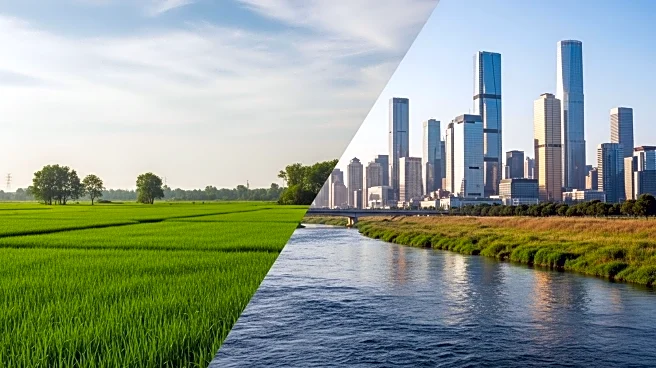What's Happening?
Arizona's new Ag-to-Urban program, effective since September 26, aims to save water by allowing farmers to trade their 'Irrigation grandfathered rights' for Groundwater Savings Credits. These credits can be exchanged for compensation when farmland is sold to developers, facilitating urbanization. The program is expected to save approximately 7.1 million acre-feet of water over the next century in Phoenix. While some farmers see this as an opportunity to profit from land conversion, others express concern over the impact on rural farming communities and the cultural shift away from agriculture. The initiative has sparked a divisive debate among farmers, with some supporting the water conservation efforts and financial benefits, while others worry about the loss of agricultural land and its implications for rural communities.
Why It's Important?
The Ag-to-Urban program represents a significant shift in Arizona's agricultural landscape, with potential implications for water conservation and urban development. By converting farmland to urban use, the program addresses water scarcity issues, a critical concern in the arid state. However, this transition may lead to cultural and economic changes in rural areas, where agriculture is a key economic driver and cultural cornerstone. The program's ability to provide financial compensation to farmers offers a pathway to retirement for those looking to exit the industry, but it also raises questions about the future of farming in Arizona. The initiative could set a precedent for other states facing similar challenges, influencing national agricultural and urban planning policies.
What's Next?
As the Ag-to-Urban program progresses, stakeholders will closely monitor its impact on water savings and urban development. Farmers and developers will continue to navigate the program's financial and logistical aspects, potentially leading to increased land sales and urban expansion. The program's success in achieving its water conservation goals could influence future legislation and initiatives aimed at balancing agricultural needs with urban growth. Additionally, rural communities may experience demographic and cultural shifts as urbanization encroaches on traditional farming areas, prompting discussions on preserving agricultural heritage and supporting affected communities.
Beyond the Headlines
The Ag-to-Urban program raises ethical and cultural questions about the value of preserving agricultural land versus the need for urban development. As rural communities face the prospect of losing farmland, the program challenges traditional notions of land use and community identity. The initiative also highlights the broader issue of water management in arid regions, emphasizing the need for innovative solutions to balance environmental sustainability with economic growth. Long-term, the program could influence national discussions on land conservation, urban planning, and the role of agriculture in modern society.










